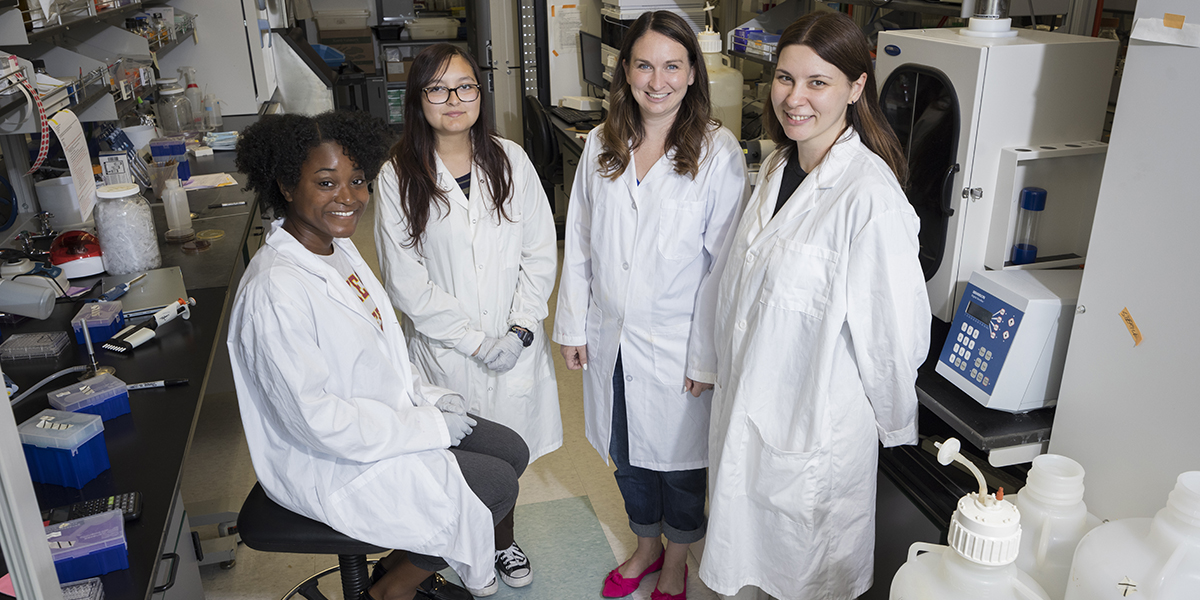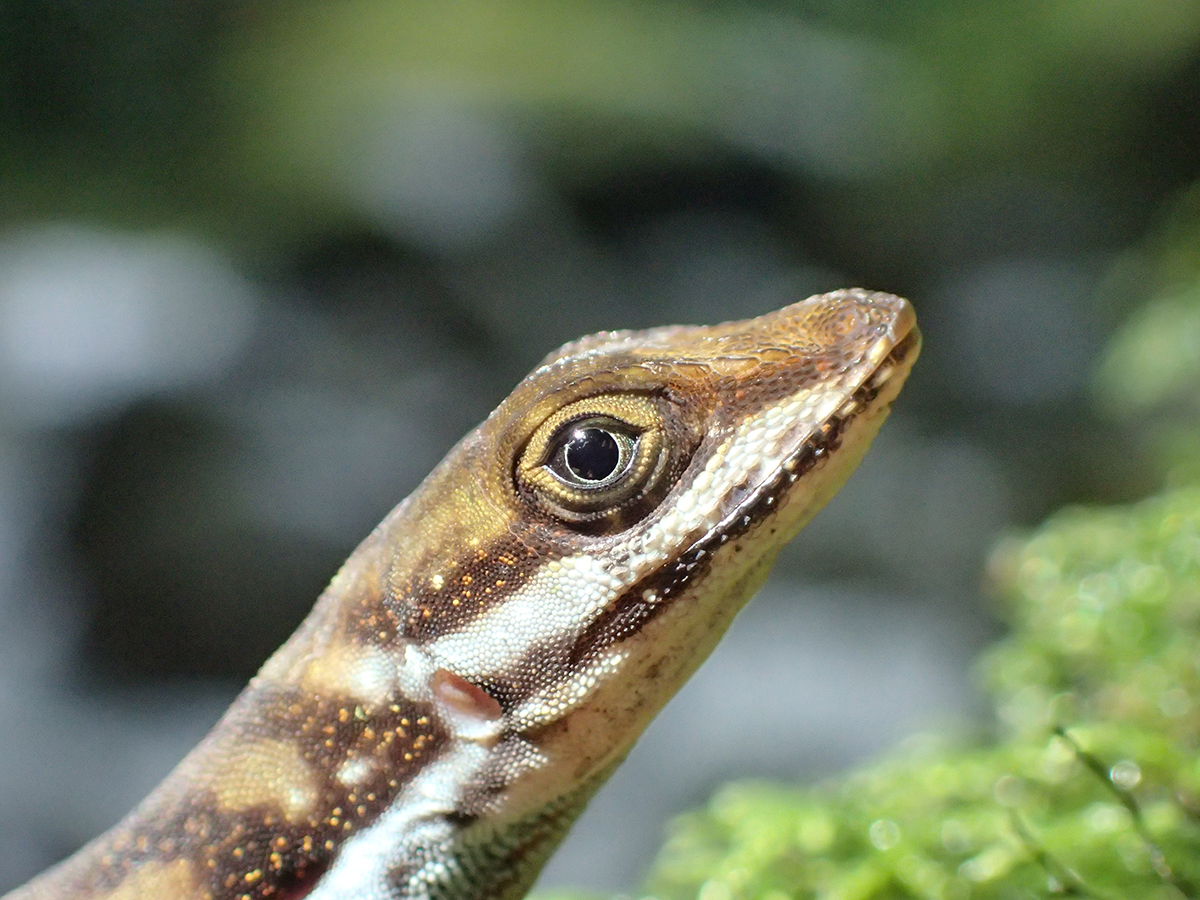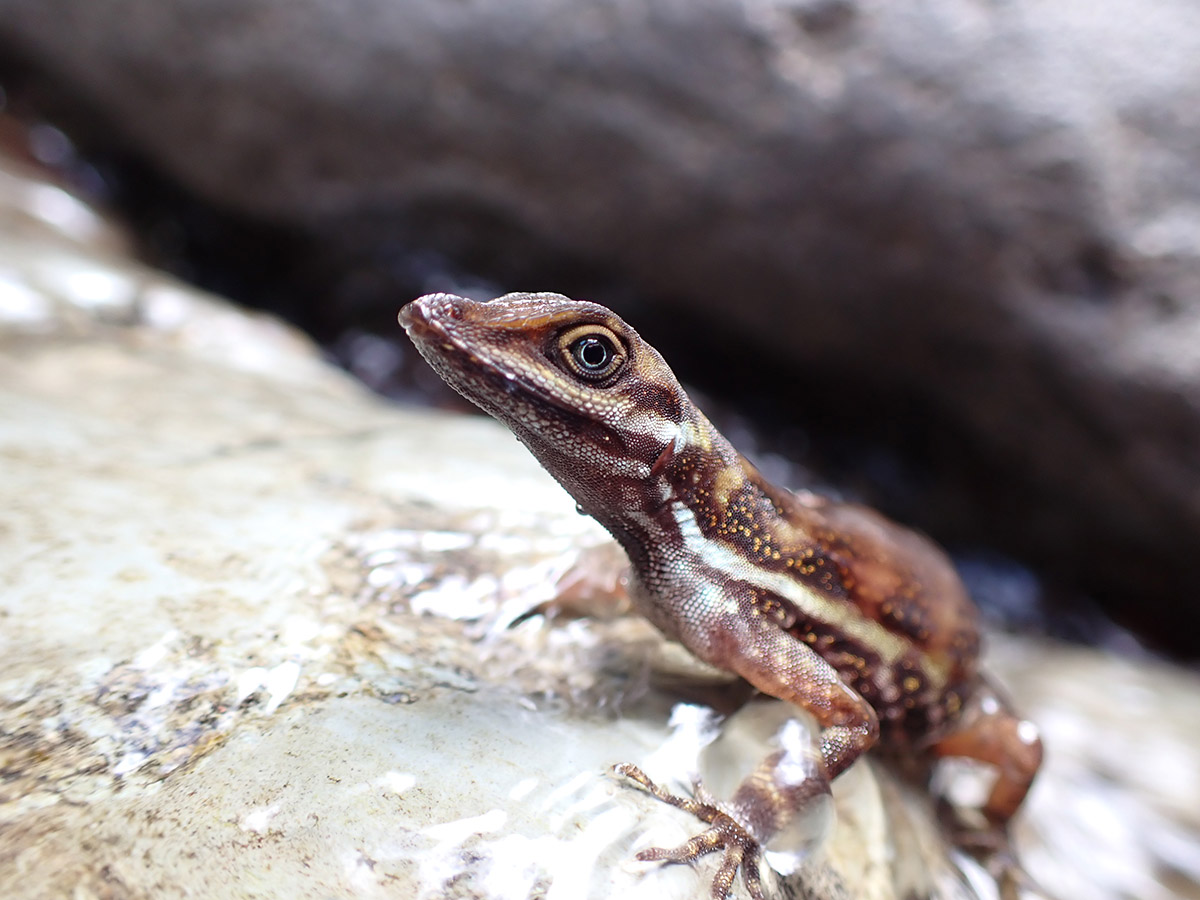Students get valuable lab time through Research Experience for Undergraduates program
Summer program funded through the National Science Foundation

The water anole, native to Costa Rica and Panama, is a funny kind of lizard.
When fleeing predators, it submerges itself underwater for long periods and breathes using a bubble of air it creates on its snout. Scientists nicknamed this “scuba diving.”
Researchers at Binghamton University are also interested in another facet of water anoles’ unique biology: How microbes on the lizards’ skin help them fend off fungal infections and may offer other beneficial adaptations.
Two faculty members from the Department of Biological Sciences — Assistant Professor Laura Cook (the microbiologist) and Assistant Research Professor Lindsey Swierk (the ecologist) — are guiding two students this summer as part of the National Science Foundation’s Research Experience for Undergraduates program.
This is the second year that REU students have explored the skin microbes of Anolis aquaticus and other lizards through the Binghamton Biofilm Research Center (BBRC), Cook said: “Every year, we find a project that crosses different disciplines and then apply to be an REU mentor. This year, we decided we could kickstart this research back in gear so we can get preliminary data to apply for bigger grants.”
Among other tasks, the students collect DNA from lizard swab samples and prepare them for analysis to determine which kinds of bacteria are present and what their capabilities are.
“These lizards live in the cool tropics, up in mountains, so they are especially susceptible to some diseases,” Swierk said. “They’re not the kind of lizard that lives in a hot desert and basks on a rock all day. They’re chilly lizards, with body temperatures at 70 degrees pretty much all year round, so they might have extra defenses. There might be differences between mountain lizards and hot, lowland desert lizards.”
Reba Booze, who will be a sophomore at Tuskegee University this fall, heard about the REU program through the New Educational and Research Alliance (newERA), which Binghamton University and six historically Black colleges and universities (HBCUs) established last year in collaboration with the Thurgood Marshall College Fund.
She appreciates getting experience with DNA technologies the NanoDrop spectrophotometer, which quantifies and assesses the purity of DNA samples: “I hope to learn a lot and foster my skills, like with the NanoDrop technique. I just finished my first year of undergrad, and I want to grow.”
Mikaela Valerio is graduating from California State University - San Marcos in the fall, so she’s grateful for the opportunities and the professional connections over the 10-week program.
“I really love research and being inside a lab,” she said. “I want to get as much experience as I can before I need to put my skills to the test in a professional setting.”
The REU program at Binghamton is hosting 10 students on campus this summer, chosen from among 300 applicants to conduct hands-on experiments. All participants work in teams, which are paired with graduate students and postdoctoral fellows in faculty mentors’ labs to guide them through their projects, and they will be trained in forming hypotheses, designing experiments, collecting and analyzing data, and reporting results.
The students also attend seminars that help them improve their networking and communication skills, as well as build their LinkedIn profiles and resumés so they are more attractive job applicants.
“Our REU site focuses on students who don’t have access to the kind of research we have here at Binghamton, which is why it was such a great pairing to work with newERA, because the whole goal of that partnership is to help those schools build more research connections and share expertise,” said Caitlin Light, PhD ’17, assistant director of Binghamton’s First-year Research Immersion Program, who also is the REU coordinator and program PI. “It’s so great that Reba can take this experience and these skills back to Tuskegee, and maybe collaborations and other opportunities will come from it. It’s exciting for both of our programs.”
Even after leaving Binghamton, Booze and Valerio’s REU experience won’t be finished: They will present their findings in November at the Annual Biomedical Research Conference for Minoritized Scientists (ABRCMS) in Pittsburgh.
With the REU as a stepping stone, Valerio is aiming for a career in molecular cell biology, while Booze would like to study cures for rare diseases such as amyotrophic lateral sclerosis (ALS) and multiple myeloma.
“A couple of my family members have been diagnosed with those diseases, and we’ve been able to cope and see how they operate now with those,” Booze said. “It’s been a source of inspiration and motivation for me to go into those areas of research.”
Both students agreed that having mentors like Cook and Swierk is inspirational for young women pursuing careers in science.
“Sometimes I have impostor syndrome, and that’s a really hard thing to deal with,” Valerio said. “This lab experience helps me to understand what I know, and it reassures me that I’m meant to be here.”


